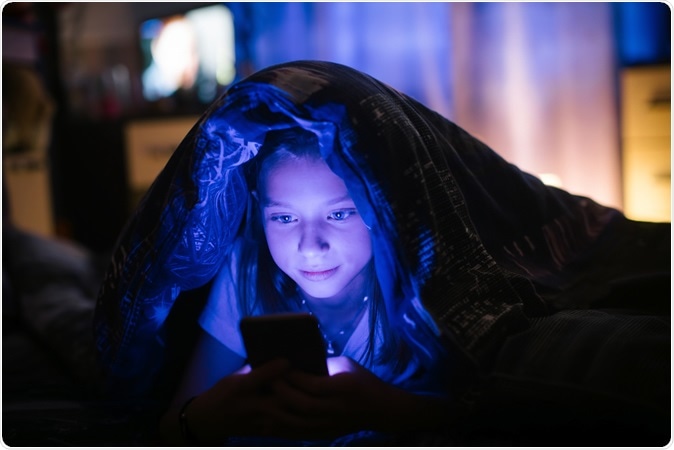Researchers have proved what has been suspected for some time now – reducing screen time for kids can improve their brain power. The team advises parents that recreational screen time in kids should be limited. Recreational screen time in kids include time spent using social media, playing video games and watching television.
The study appeared in The Lancet Child & Adolescent Health journal and is titled, “Associations between 24 hour movement behaviours and global cognition in US children: a cross-sectional observational study.”

Image Credit: De Visu / Shutterstock
In this new study the team of researchers surveyed over 4,500 American children aged between 8 and 11 years. The study was conducted between 1st September 2015 and 15th September 2017. They noted how much of the time the kids were spending on physical activity, sleep and recreational screen time. The Canadian 24-Hour Movement Guidelines for Children and Youth recommend that children of this age require 9 to 11 hours of sleep a day and at least one hour of physical activity. The guidelines recommend limiting total screen time to 2 hours per day and less. The researchers of this study compared the findings from the participants against these guidelines.
The participating 4,524 children from 21 study sites across United States were provided with questionnaire that asked them about how they spent their time. Further they had cognition tests that looked at language, executive function, attention, episodic and working memory, processing speed etc. Using various standardized tests. Other factors such as parental and child’s education, pubertal development, body mass index, ethnicity, household income and history of traumatic brain injury in the child were take into account while assessing the connection between the study variables.
They noted that the kids that adhered to these guidelines were more likely to be better at cognition and cognitive skill tests compared to those who did not. Children who stuck to less than two hours screen time were most likely to perform better on the cognitive tests they noted. Sleeping for the recommended number of hours too was associated with better cognitive skills development.
The study found that little over half of the kids were sleeping for the recommended duration and 37 percent of the children were adhering to the recommended screen time guidelines. Only 18 percent of the children were physically active for one hour per day as per the guidelines. Further only one in 20 children met the guidelines for all three requisites. On an average a child was spending around 3.6 hours per day looking at a screen the study noted.
Study leader Jeremy Walsh of the CHEO Research Institute in Ottawa, Canada, said more studies that look at the connection between limiting screen time and cognitive skills is necessary particularly with different types of screen time. He explained screen time with educational content and those that require “focus or multitasking” vis a vis those that are purely for entertainment need to be compared. “Paediatricians, parents, educators, and policymakers should promote limiting recreational screen time and prioritising healthy sleep routines,” Walsh said.
The authors in their study conclude, “Meeting the 24 hour movement recommendations was associated with superior global cognition. These findings highlight the importance of limiting recreational screen time and encouraging healthy sleep to improve cognition in children.” The study was funded by the National Institutes of Health.